The real truth of hockey performance is that we are now living in an age where the abundance of accessible information is so great that we are in a strange cultural state of facts/alternative facts, information/misinformation, and everything else in between.
It is naïve to think all these content providers and “experts” are well-read in terms of scientific data and well-established in terms of credentials.
Do you want the truth when it comes to on-ice domination?
It’s not about incorporating another calorie calculation or special set of cones to stickhandle around. The reason you haven’t reached your potential yet is because you’re too inconsistent in executing a well-designed plan.
Talk to any sports psychologist and they will tell you that both winning and losing are habits. So the real trick to achieving total domination out on the ice is setting up your individual world in a way that leads to winning the process, while minimizing any and all possibilities of failure.
The nine keys to creating an unstoppable mindset below are extracted from my own successes in life, from what’s been demonstrated to be effective within sports psychology research, as well as from the experiences of the best hockey players in the world that I have directly worked with.
Looking in the rearview mirror at my career while contemplating all of the above, I can tell you emphatically that these factors are crucial must-haves for achieving your ultimate potential in hockey.
Determination
Determination is something that extends well beyond a quick moment of making a motivated decision. Heck, every single New Year’s Eve, millions of people make a motivated decision that they are “determined” to keep. We know how that usually ends up.
Motivation will never get you where you want to go, because it is merely what lights the wick of declaring a goal. It’s determination that keeps that wick burning. Determination is not a one-time event like motivation is; determination is your own internal, everyday reminder to stay the course.
What you need to embrace and digest is that you have to encourage yourself every step of the way. If you expect that to come from someone else, you’ve already lost. Real determination is fueled by constant self-encouragement.
For example, you can’t just play competitive hockey for several years and then join the NHL just by being “motivated to go to the NHL.”
The motivation to “do it” and the determination to “become it” are two entirely different things. But so many hockey players don’t distinguish between them when it comes to setting their goals.
You have no idea what living a high-performance life is like and how much it will change you until you actually live it, accept it, and habitually incorporate it into your ongoing, goal-driven process.
Always remember that your motivation to “do it” is only your starting point. Anyone can be motivated, but only real and authentic determination will allow you to stay the course through all of the highs and lows you will inevitably come across on your journey to the top.
Discipline
Self-control must be exercised to make self-control itself stronger, and for it to become a force that works for you. When you discipline your mind, your behavior will follow.
When times get tough, you have to adapt. Most hockey players who are motivated to become the best but not truly committed to becoming the best will drop out at the first sign of hardship.
Almost always it’s because they just didn’t develop the discipline required to keep up with the necessary workload to become the best version of themself. It’s a lot easier to eat junk food and play video games than it is to meal prep and exercise.
High performers are disciplined enough to do what they need to do before they do what they want to do. This is a commitment to the process of proper preparation for performance, and this can never happen without real and authentic self-control.
When it comes to all of your hockey goals, the ones who do what they want to do before what they need to do are the ones who effectively sabotage their own efforts toward progress.
This isn’t your genetics failing you—it’s your self-control.
Relentlessness
Determination and discipline combined together create a type of relentlessness that only the most elite hockey players possess. You have to prioritize your course of action and then keep showing up for it—no matter what it takes.
This isn’t about what you feel like doing, it’s about doing what you know you need to do.
When it comes to doing what needs to be done consistently to achieve a goal, a high performer doesn’t give themself the choice to do other things instead.
As a hockey player, to stay locked-in to the process, try thinking about your parents and their jobs. They have to carve out time to be at their jobs no matter what or they won’t get paid. You need to look at your hockey habits the same way. You need to think, “My parents could never just skip work if they wanted to. It’s not an option.” Anytime someone suggests you skip a session, you don’t.
So when it comes to your hockey training to-do list, this type of mindset gives you no choice for other options during your “work hours” because if you skip it, you’ll never “get paid” in the rewards of becoming a better hockey player.
How many of you treat your goals like you would a job?
If you began your answer with “Ok, but…” then you have to accept that you’re not as relentless as you need to be if becoming the best hockey player you can be is something you truly desire.
When you are relentless, nothing can stand in your way, because you leave yourself no choice but to keep moving forward.
Preparation
You would think if you set a serious goal for yourself that you would have your preparation down to a science. But you wouldn’t believe how disorganized many hockey players seem to be, and disorganization makes it that much harder to achieve any goal.
I remember that back in college, I was struck by how unorganized so many of my fellow students seemed to be. If they didn’t have classes, they would sleep until noon. They would stay out all hours of the night, often spending most of their money at the bar and being hungover the entire next day before they repeated the process all over again.
They would have to play catch-up constantly and pull all-nighters to prepare for exams or get assignments handed in on time. I remember observing all the added stress this seemed to place on them, and it was simply due to their inability to get organized.
I graduated with honors and even earned three training and nutrition certificates while in school on top of the full-time curriculum, my training, my dieting, and commuting two hours every school day. This didn’t happen by mistake; I knew what I wanted and prepared my schedule to meet the demands.
All these years later, I still witness the same fault with so many hockey players seeking to improve their game and transform their bodies. And yet, they don’t realize they make life so much harder on themselves than it has to be because they don’t organize their lives to create the environment necessary to succeed at their goals.
Being surrounded by clutter, waking up and going to bed at different times, procrastinating meal preparation, and winging your training windows does not serve you a smooth path to achievement. Disorganization creates reactive thinking rather than proactive thinking, and nobody has ever reacted their way to sustainable achievement.
Preparation and organization produce proactive thinking, and proactive thinking is a hallmark of high-performance living.
Daily Structure
The most productive people on this planet are masters of daily structure. Everything has a schedule.
First, look at the things you have less control of, such as your class or work schedule. Then, structure your days and weeks around that reality so you can create a sustainable and realistic action plan toward goal achievement.
This goes for the big things and the small things. You structure what day and time you do your laundry, when you go to the grocery store, when you study, when you do your skill work, when you train, when you meal prep, when you allow yourself “me time” to do whatever you want, and everything in between.
The take-home point here is that general structure leads to specific structure. You need to start somewhere, and when you do, your life becomes ten times easier because a predictable and productive day is an enjoyable day.
By contrast, it naturally makes your goals easier to achieve as well, because the actions required to become who you want to be aren’t driven by motivation, but instead by consistent daily actions structured realistically into your routine.
Just like your workouts should be structured during the in-season to get the best possible results, your day, meal times, and daily routines should be structured, because elite performance is a full-time job you need to be accountable to if you’re serious about becoming a killer hockey player.
Real and authentic structure is how you clear the path of any obstacles that may stand in your way.
Consistency
Go ahead and study anyone who has achieved a major goal and maintained that success over a long period of time.
What you will not witness is magic tricks and special secrets that got them there faster.
What you will witness time and time again are the non-sexy regimentation elements of consistency.
The best athletes in the world will tell you that their day-to-day life is rather constant and predictable. They practice consistency and routine not because they have to, but because it is the lifestyle they have created for themselves over time to guarantee success.
Consistency creates habits that become automatic. This is true for either positive or negative habituation.
Hockey players practice fundamental skills from childhood to the day they retire. Consistency and routine, even at the most basic level, are a necessary component of their excellence.
If you remain consistent to the process, the results of the process will remain consistent to you.
Investment
The way you look at things is everything. Perception is reality.
Many hockey players fail to achieve their goals because they have a faulty perception when it comes to the actions required to up their game.
They keep focusing on all the sacrifices they have to make and all the things they are giving up in order to achieve their goal. Some may have even read some of the words in this article so far and thought that I am being “unfair” by asking them to sacrifice so much to the sport of hockey.
Well, if you think I’m being unfair, consider where your perception is coming from first.
The best hockey players in the world don’t think in terms of sacrifices. They think in terms of investments.
When you master all of the mental traits I have discussed so far, your attitude will change dramatically. You will never look at anything hockey-related as sacrificing anything that you didn’t want to sacrifice in the first place.
Poor discipline, faulty determination, bad preparation, zero relentlessness, broken structure, and half-hearted consistency all sound like traits we can agree you don’t want to carry around with you.
With this attitude, you allow yourself permission to pursue your hockey dreams with investment and sincerity rather than sacrifice and regret.
Living your best life and achieving your hockey goals isn’t something you have to do, it’s something you get to do.
Acceptance of Change
If you really want to reach your potential in this sport, you need to be mature enough to accept that change takes place on change’s terms—not yours, and not the dream world you create in your mind about how it’s going to be.
My wife and I are expecting our first child soon, so we often ask friends for advice. Recently, a couple we know told us about when they were having their first kid, they created all of these scenarios about how it was going to be, when the baby was going to sleep, when it would feed, etc. Then, when the baby arrived, they laughed at how many of their preconceived ideas immediately flew right out the window when they realized that the baby ran the agenda for the most part. Go figure.
This parallels our hockey goals, because the best case scenario we tend to create in our minds often becomes our worst obstacle.
“Well, this isn’t how I thought it was going to be! What’s wrong!?”
This leads to disappointment, self-sabotage, and often quitting the process entirely to jump on the next “magic trick” solution that gets marketed to them.
Change is hard, even when we accept it’s going to be hard. But to resist this reality and expect change to be easy is pure fantasy that hurts you more than it helps you.
Your acceptance mindset must include flexibility and adaptability, because without wiggle room for all of life’s hurdles, you will inevitably hit a roadblock. It’s your choice on whether or not this roadblock has a detour, and it all comes down to your mindset.
Focus on the Process
There is a big difference between focusing on reality versus focusing on a fantasy-based outcome of how you wish it would be.
Wanting to reach your potential has very little bearing on actually doing what it takes to get there. You must embrace the process that’s required on a daily basis to get the job done.
When you “level up” for the first time into a new league, it’s natural to feel extremely intimidated. The skills that allowed you to sail through the league you were previously in simply won’t matter much at this new level.
The practices will be harder, the scouts are watching closer, the games will be more intense, and it will all feel completely new to you. You need to adapt or you’ll never last.
This adaptation process will be personalized. But once your days become structured and your mental strength adjusts to the new perspective, the intimidation factor will drift away as your skills and confidence level up.
Your skills must be stronger than your fears. This is the key to feeling like you “belong” at this new level. And the only way you will raise your skills to be greater than your fears is to focus on the process-based habits of goal achievement, which is nothing more than what I have already taught you above.
Keep your nose to the grindstone and don’t get in your own way. You’re there for a reason, so level up and start acting like it by creating a daily structure of process-based habits for hockey success.
Your Pathway to Total Domination
I have coached thousands of hockey players in my career, and an undeniable factor in what creates the type of transformative season that generates the “wow effect” in the coaches, parents, and scouts is a complete in-season program design that includes an approach to both mind and body.
A hockey-specific program design for the body is what keeps your functional strength, explosive speed, shot power, fluid mobility, elite edge work, technical skill expression, and conditioning sky-high throughout the entire in-season.
Naturally, this physical readiness represents a serious hockey player’s approach to structure, process, and investment toward creating the perfect hockey performance machine.
Yet, this is only truly beneficial if it is backed up with the mental and emotional protocols that a hockey player needs to sharpen their discipline, determination, acceptance, consistency, preparation, and relentlessness to take their “Hockey IQ” and all-around peak performance capacity to the next level.
This year’s In-Season ‘21 Hockey Training program is the culmination of a career’s worth of hard work and experience to create the proprietary FRESH FACTOR™ System, which addresses everything you have seen in this article as well as several others in a functional, hockey-specific manner.
Put simply, if any of my words have resonated with you today, this is your path to total domination.
Final Thoughts
As a young man, I had none of this stuff figured out in advance. As I grew older, it all unfolded in front of me piece by piece as I set my own goals and aided high-performance athletes toward achieving theirs as well.
Basically, I stumbled upon the above achievement formula and I got lucky.
It’s only in retrospect that I can outline for you the components of high performance and the relevant factors you can commit to that I see so many hockey players fail at, so you can avoid these obstacles and become the best hockey player you can be.
Motivation is convenient when available, but you can’t rely on it if you want to dominate on the ice this year, because it comes and goes just like the weather.
The above must-haves will keep you in a high-performance state of mind all in-season long, which allows you to crush everything in your way.
So, the only conclusion you should draw from this article is that when you get your mind right, your achievements are inevitable.
Join the In-Season Domination ‘21 team and let’s crush this thing.

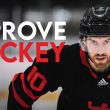


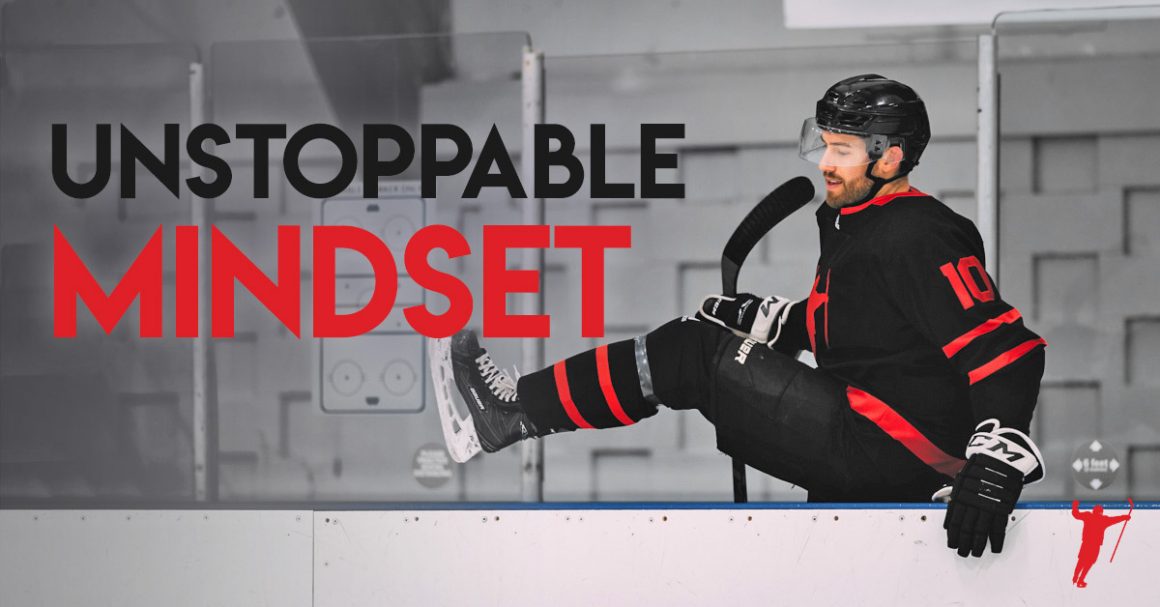


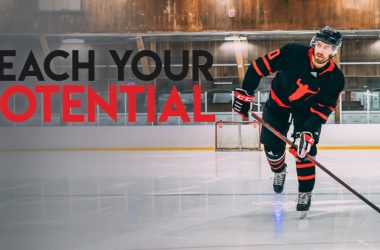
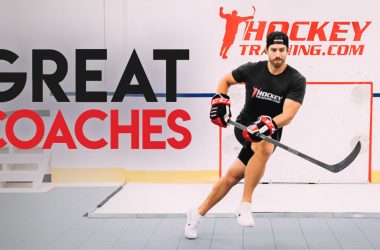
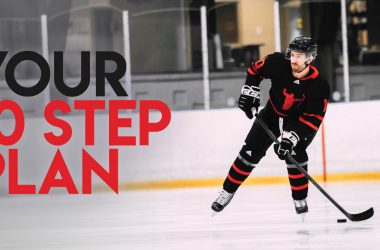
Another exceptionally well-written article. I read this twice over the weekend, and I particularly like your view on accepting change. Thanks Dan!